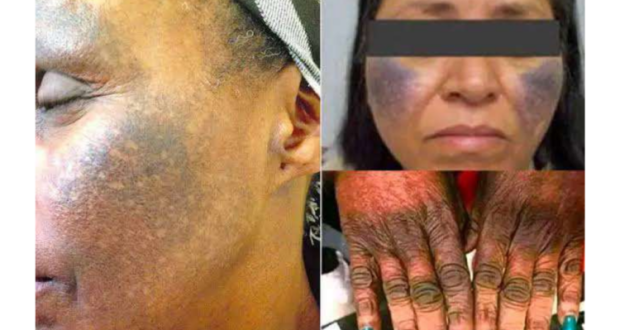While many Nigerians struggle to keep up with economic realities, others, especially women, appear to be still concerned about their looks, including their skin colour.
This desire to look exceptionally good drives a lot of black women into skin bleaching, with the use of skin-lightening products popularly known as bleaching creams. This practice is common in Nigeria and other parts of Africa, with many people using skin-lightening products to achieve a lighter complexion.
Statistics compiled by the World Health Organisation (WHO) in 2011 showed that 40 percent of African women bleach their skin, with Nigeria leading the chat with a staggering 77 percent of women bleaching, 59 percent in Togo, 35 percent in South Africa, 27 percent in Senegal and 25 percent in Mali.
The National Agency for Food and Drug Administration and Control (NAFDAC) is responsible for regulating sale and distribution of skin-lightening products. The agency has, therefore, raised the alarm over the abuse of skin-lightening products in the country, saying defiant users risk skin cancer, organ damage, and even death.
Director-general of NAFDAC, Prof. Mojisola Adeyeye, warned Nigerians to desist from using unauthorised cosmetics and dangerous chemicals for skin bleaching with the intention to enhance their beauty. Some skin-lightening ingredients such as hydroquinone have been linked to an increased risk of skin cancer, especially when used in high concentrations or for prolonged periods.
In a study conducted in Nigeria, it was found that 30.6 percent of women who used bleaching creams experienced skin irritation. A study conducted in South Africa revealed that 70 percent of skin-lightening creams contained high levels of mercury. Also, a study conducted in Ghana found that 70 percent of patients with kidney disease had a history of using bleaching creams.
On the practice of mixing chemicals with natural products like pawpaw, carrot, etc which is also becoming a trend, Adeyeye said majority of spa outlets in the nation’s cosmopolitan cities were culpable in this unhealthy practice. She said the spa outlets make creams for clients’ use from the mixtures, adding that the products are thereafter packaged, labeled and sold online to clients.
She lamented that the spa owners have gone further to influence some clinics with medical doctors joining to carry out these nefarious activities which have advanced to include injected substances Vitamin C infusion and glutathione on clients. He disclosed that most of the products used in these mixes are smuggled into the country and are unregistered, citing formulations containing Kojic Acid and hydroquinone that are above their permissible limits in the formulations and therefore at risk of causing harm.
Speaking on the agency’s effort to rid the country of such products, Adeyeye pointed out that it was for safety reasons that the use of mercury was banned in cosmetics. “We don’t just ban products because they are bleaching agents but are prohibited because of safety issues surrounding particular ingredients in the products as they could cause skin cancer as well as damage the liver and kidney,” she said.
A director at the agency, Monica Eimunjeze, warned that these bleaching products contain toxic chemicals, adding that accumulation of toxic chemicals affect the organs. She said; “There are many consequences such as kidney failure, liver damage from accumulation of toxic chemicals within the system, so we want people to be aware of this and try to modify their behavior.
“When you use a product that has chemicals that could affect the body in many ways or systemically, it causes reaction on the skin and could affect the organs. Although, people have the right to make choices but you need to make informed choices that will guide you and not the one that will hurt you.”
Some people end up bleaching their skin by using organic products meant to maintain their natural complexion and enrich their skin vitality. Yet, the use of these organic products is becoming a fashion in Nigeria as more people prefer to patronise these products, thinking they are made from local natural ingredients and safe for the skin.
On this, Eimunjeze said not all organic products are good for the body, especially if the products are not under regulation. Corroborating this, a pharmacist at the National Hospital, Jelili Kilani, told LEADERSHIP Weekend that skin lightening creams affect the texture of the skin and then make such people prone to developing skin cancer at the later stages of their lives.
Jelili, who was a chairman of the Pharmaceutical Society of Nigeria (PSN), FCT chapter, said this is because these people have already tempered with the natural coral of the skin. He said; “We don’t advise people to bleach their skin because in the cause of bleaching, the natural immunity that the skin is supposed to have will be tempered with. It lightens the skin, it also makes the skin tissue tin and you see they are prone to have skin injury. One should actually avoid it because we really don’t need it.”
On why people, especially women bleach their skin, Jelili said it’s because they want to appear more beautiful, saying that people should know that just appearing as natural as they are is beautiful. However, in spite of awareness on the effect of bleaching agents on human health, the global market for skin-lightening products reached a valuation of around $10bn in 2021 and is slated to accelerate at a CAGR of 7.5 percent to top $22bn by 2023.
Demand for creams and lotions is set to increase at a high and is set to increase at 7.5 percent across the assessment period of 2022-2032. Asia Pacific accounted for the maximum share of 54.8 per cent in the global skin-lightening products market in 2021. North America is the second fastest-growing market and is expected to witness a CAGR of 5.6 percent in the forecast period. North America occupies a share of about 22 percent of the global market. In Nigeria, the beauty industry was worth over $4 billion as of the spring of 2019, and is predicted to increase by 8-10 percent yearly; this shows how viable the industry is in Nigeria.
(leadership.ng)
 Newsfront Online …Telling the Public as it is
Newsfront Online …Telling the Public as it is




